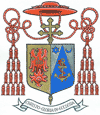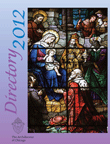
The Cardinal's Column
Francis Cardinal George, O.M.I.
From one homeland to another
Cardinal George's Schedule
- March 18: 12:30 p.m., Golden Jubilee Mass for Bishop Lawrence Sabatini C.S., Holy Rosary Church (Western Ave.)
- March 19-March 21: United States Conference of Catholic Bishops (USCCB) Administrative Committee Meeting, Washington, D.C.
- March 22: St. Anselm Institute for Catholic Thought Lecture, Charlottesville, Va.
- March 24: 9 a.m., Archdiocesan Pastoral Council Meeting; 6:00 p.m., Casa Jesús 20th Anniversary Dinner, Berwyn
- March 25: 11 a.m., Rededication Mass, St. Joseph Parish (Orleans Street)
- March 26: 7 p.m., Joseph Cardinal Bernardin 2007 Jerusalem Lecture, Spertus Institute
- March 27: 1 p.m., Administrative Council Meeting; 7 p.m., Course Lecture, University of Chicago Law School
- March 28: 1:30 p.m., Installation Mass for Bishop George Murry, S.J., Youngstown, Ohio
- March 29: 9 a.m., Convocation with the Leadership of Religious Communities, Queen of All Saints School; 6 p.m., Mundelein Semi-nary's An Evening of Tribute, Sheraton Chicago Hotel
- March 30: 4 p.m., Convocation of Catholic Faculty, Loyola University (Water Tower Campus)
- March 31: 9 a.m., Archdiocesan Women's Committee Meeting

During the season of Lent, everything about the Mass and the daily prayers of the Church are designed to remind us that we have here no lasting city, that our true homeland is heaven. The discipline of Lent shows us how to live now in God's company and to find in him our true home. We live here in the belief that we are all immigrants who hope to reach heaven.
The topic of immigration is often explosive, but perhaps placing it within the context of the spiritual journey each of us undertakes during Lent can help all to see immigrants with eyes of faith.What prevents some U.S. citizens from seeing immigrants with benevolent eyes is the fact that many would-be immigrants are here without the papers that would permit them legal entrance into the United States. The sheer force of their numbers encourages comparison to an invasion, an illegal presence of foreigners on our soil.
Without minimizing these facts, there are nevertheless factors other than status before the civil law to be considered in looking at foreigners and examining the immigration question with eyes of faith. Faith sees people first of all as children of God and deserving of respect because made in his image and likeness. This is true for criminals as well as for astronauts, for the mortally ill as well as for hockey players, for the poor as well as for movie stars.
Both those who say all illegal immigrants should be immediately expelled and those who say we need them as much as they need us would seem to agree that the control of our borders is inadequate. Human trafficking and the danger of betrayal and death at the border make it necessary that our borders be better protected.
Of itself, however, improved border control does not answer the question of how to see and treat those illegal workers who are already here, many of them for decades.
For several years, the U.S. Bishop shave been seeing and hearing the eleven million illegal immigrants in our country and have been asking for comprehensive reform of immigration policy. A reformed policy would include attention to the root causes of migration from one country to another.Most often these causes are economic but sometimes they are political or familial. The policy would provide a path to citizenship for undocumented workers and their families through an earned legalization program. It would also create a temporary worker program, with protection for the rights of both U.S. and foreign laborers.It would encourage the reunification of families and reduce the fear of separation that now haunts many households. Finally, a reformed policy would guarantee due process protections to all in this country, whether citizens or not.
Elements of this program for the reform of immigration policy can be found in many bills that have been before Congress for the past two years. Parts of the program have been promoted by the President and other political leaders, but little has been accomplished so far at the political level. It seems that neither political party right now regards the resolution of this human dilemma asa priority.
At the pastoral level, many priests have accompanied those who are part of our parishes, even though their status is not legal. Priests are always to address the people in front of them and be concerned about their needs. This is first of all a matter of the respect due to every human being. It is also a recognition that, when the Bible speaks of justice, it isn't first of all speaking about legality or equality; it is speaking of relationship, first to God and then to all those whom God loves. Scriptural justice is a matter of right relationship.
"Priests for Justice" is a group of priests of the Archdiocese who have taken up the program of the U.S. bishops for comprehensive immigration policy reform and inserted into it the concrete needs of immigrants here. Since last summer, I have tried to follow their work and respond to it. I am profoundly grateful to them for walking with their people and advocating for their moral and human needs. They are concerned about establishing right relationships among all of us.
There are many dimensions to the immigration question, many problems that are unresolved, many claims that complicate a resolution acceptable to all. Behind all the complications and difficulties, however, there are millions of people whom we should see with the eyes of faith. Faith enables us to see ourselves and others as God sees us and them. Seeing ourselves from God's viewpoint leads us to gratitude for his mercy; seeing others from God's viewpoint enables us to be merciful to them. Seeing everyone as a child of God enables us to recognize our brothers and sisters. With that vision, we should try to resolve our ideas and our conscience about immigrants and immigration reform.
Halfway through our Lenten journey,I pray that all of us have a heightened awareness of where our true home is and who are our companions on the way. God bless you.
Sincerely yours in Christ,
Francis Cardinal George, OMI
Archbishop of Chicago



